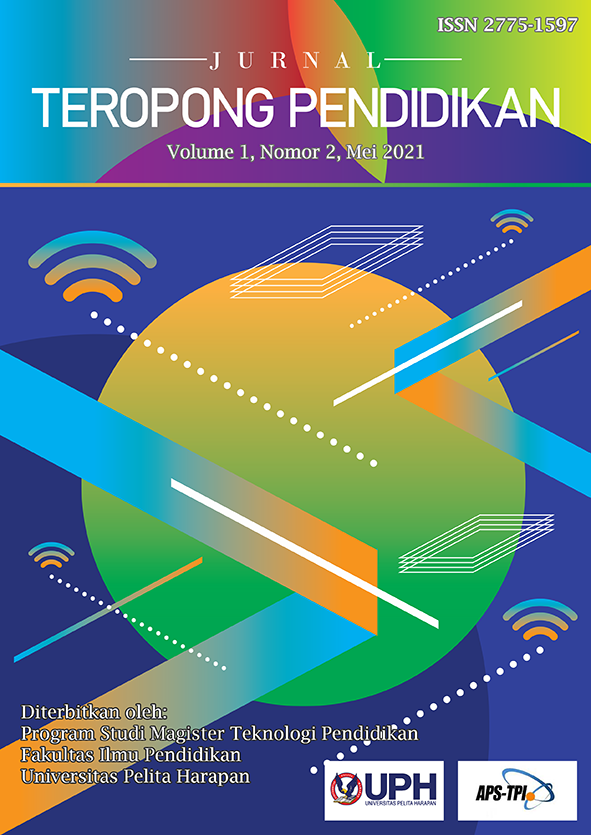MENINGKATKAN SIKAP TOLERANSI PADA DOMAIN AFEKTIF, KOGINITIF DAN PERILAKU SISWA DALAM INTEGRASI PENDIDIKAN AGAMA KRISTEN DAN BUDI PEKERTI MELALUI PENERAPAN METODE FILMED ROLE-PLAY [INCREASING TOLERANCE IN STUDENTS' AFFECTIVE, COGNITIVE, AND BEHAVIOUR DOMAINS THROUGH THE INTEGRATION OF CHRISTIANITY AND MORAL STUDIES USING THE FILMED ROLE-PLAY METHOD]
DOI:
https://doi.org/10.19166/jtp.v1i2.3463Keywords:
Tolerance, religion, Christianity, morality, affective domain, cognitive domain, behavioral domain, filmed role-play methodAbstract
Indonesia is a religion based country. Religion studies should be positioned as school’s curriculum priority, both in public and private school. Integrated Christianity and moral studies might be the solution of conflicts within family, school, community, both national and international societies. One of many values that urgently needs to be promoted is an attitude of tolerance in facing our multicultural society. School as an educational institution has an important role in teaching tolerance skill to students as early age. One of the challenges is finding the right method to deliver the abstract concepts to children who are in the stage of pre-operational concrete. This research has done an introductionary study towards the bullying case that happened earlier in the researchers workplace 4th and 5th graders within 4 months. Therefore, this research address the urgency of an integrated curriculum of Christianity studies with moral studies practices, specifically on multicultural values through experiential learning with filmed role-play. Research was conducted in XYZ School for primary 3, 4 and 5. This instructional strategy resulted in increase of attitude of tolerance both in cognitive and behavior domain, but has no increase in the affective domain. All respondents agree by implementing filmed role-play has contributed to their deeper understanding towards the concept of tolerance.References
Adler, E. S., & Clark, R. (2015). An invitation of social research: How it’s done. Cengage Learning.
Ali, M. (2003). Teologi pluralis-multikultural: Menghargai kemajemukan, menjalin kebersamaan. Kompas.
Anker, T., & Geir, A. (2017). Relocating respect and tolerance: A practice approach in empirical philosophy. Journal of Moral Education, 47(1), 48-62. https://doi.org/10.1080/03057240.2017.1360847
Armstrong, E. K. (2003). Applications of role-playing in tourism management teaching: An evaluation of a learning method. Journal of Hospitality, 2(1), 5-16. https://citeseerx.ist.psu.edu/viewdoc/download?doi=10.1.1.603.1204&rep=rep1&type=pdf
Baidhawy, Z. (2005). Pendidikan agama berwawasan multikultural. Erlangga.
Bennett, D., & Dodge, K. (2014). It was like a mirror: A reflection on filmed role play simulation. Mount Royal University Institutional Repository. https://core.ac.uk/download/pdf/51439921.pdf
Pack-Brown, S. P., & Williams, C. B. (2003). Ethics in a multicultural context. Sage Publications.
Çerkez, Y., Altinay, Z., Altinay, F., & Bashirova, E. (2012). Drama and role-playing in teaching practice: The role of group works. Journal of Education and Learning, 1(2). https://doi.org/10.5539/jel.v1n2p109
Council of the European Union. (2009). Council resolution of 27 November 2009 on a renewed framework for European cooperation in the youth field (2010-2018). Official Journal of European Union. https://eur-lex.europa.eu/legal-content/EN/TXT/PDF/?uri=CELEX:32009G1219(01)&from=EN
Dalege, J., Borsboom, D., van Harreveld, F., van den Berg, H., Conner, M., & van der Maas, H. L. J. (2016). Toward a formalized account of attitudes: The Causal Attitude Network (CAN) model. Psychological Review, 123(1), 2-22. https://doi.org/10.1037/a0039802
Fry, H., Ketteridge, S., & Marshall, S. (2008). A handbook for teaching and learning in higher education: Enhancing academic practice (3rd ed.). Routledge. https://doi.org/10.4324/9780203891414
Gilbert, R. (2004). Studying society and environment: A handbook for teachers. Macmillan Publishers Australia.
Koc, M. (2011). Let’s make a movie: Investigating pre-service teachers’ teflections on using video-recorded role playing cases in Turkey. Teacher and Teaching Education, 27(1), 95-106. https://doi.org/10.1016/j.tate.2010.07.006
Kolb, A.Y., & Kolb, D. A. (2012). Experiential learning theory. In N. M. Seel (Eds.), Encyclopedia of the sciences of learning. Springer. https://doi.org/10.1007/978-1-4419-1428-6_227
Moon, J. A. (2004). A handbook of reflective and experiential learning: Theory and practice. Psychology Press.
Piaget, J. (1964). Part I: Cognitive development in children: Piaget development and learning. Journal of Research in Science Teaching, 2(3), 176-186. https://doi.org/10.1002/tea.3660020306
Raihani. (2011). A whole-school approach: A proposal for education for tolerance in Indonesia. Theory and Research in Education, 9(1), 23-39. https://doi.org/10.1177/1477878510394806
Rapp, C., & Freitag, M. (2015). Teaching tolerance? Associational diversity and tolerance formation. Political Studies, 63(5), 1031-1051. https://doi.org/10.1111/1467-9248.12142
Robinson, L., & Kelley, B. (2007). Developing reflective thought in preservice educators: Utilizing role-plays and digital video. Journal of Special Education Technology, 22(2), 31-43. https://doi.org/10.1177/016264340702200203
Smyth, K., & Mainka, C. (2010). Pedagogy and learning technology: A practical guide. Edinburgh Napier University.
United National Educational, Scientific and Cultural Organization. (1995). Declaration of principles on tolerance.
Van Driel, B., Darmody, M., & Kerzil, J. (2016). Education policies and practices to foster tolerance, respect for diversity and civic responsibility in children and young people in the EU. NESET II report. Publications Office of the European Union. https://doi.org/10.2766/797305
Van Sickle, R. (1978). Pedagogy and learning technology: A practical guide. Edinburgh Napier University.
Wardani, I. G. A. K. (2014). Penelitian tindakan kelas. Universitas Terbuka.
Wohlking, W., & Gill, P. J. (1980). Role playing. Educational Technology.
Zingaro, D. (2008). Group investigation: Theory and practice. https://www.semanticscholar.org/paper/Group-Investigation%3A-Theory-and-Practice-Zingaro/aef4a33c8ae572f35c4398f192d6468839290a8b
Downloads
Published
Issue
Section
License
Authors who publish with this journal agree to the following terms:
1) Authors retain copyright and grant the journal right of first publication with the work simultaneously licensed under a Creative Commons Attribution License (CC-BY-SA 4.0) that allows others to share the work with an acknowledgement of the work's authorship and initial publication in this journal.
2) Authors are able to enter into separate, additional contractual arrangements for the non-exclusive distribution of the journal's published version of the work (e.g., post it to an institutional repository or publish it in a book), with an acknowledgement of its initial publication in this journal.
3) Authors are permitted and encouraged to post their work online (e.g., in institutional repositories or on their website). The final published PDF should be used and bibliographic details that credit the publication in this journal should be included.







